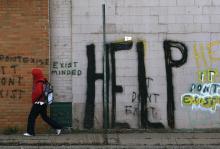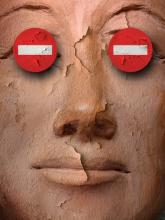systematic injustice

MY FIRST JOB out of college was teaching at-risk black and Puerto Rican kids in an alternative high school setting. At 20 years old, fresh from a critical theory-oriented undergraduate curriculum, I basically taught what I had read in college: bell hooks, Audre Lorde, Paulo Freire, Noam Chomsky. I was thrilled to do it. After all, in front of me were the people that I had studied in those critical-theory classes—“the oppressed.” And here I was to deliver liberation.
“Is this going to get me my GED?” a skeptical student named Angel asked me at one point. “If I pass, I get $1 an hour more at Cub Foods, and my girlfriend is pregnant, so, you know, I gotta get that. I ain’t slanging [dealing drugs] no more.”
I wanted to tell Angel that I was providing him far more than material gain. I was the bearer of soul freedom.
When Joel, the math teacher at the school, caught wind of what I was doing, he about put me up against the wall. “Are you crazy?” he said. “You walk in here from your privileged life and start delivering oppressive-systems mumbo jumbo to kids who need to learn how to read? Teach them that they need to work their butts off to pass the damn test. Stop giving them an excuse to blame the system.”
It is one of the most important lessons I’ve ever gotten in my life: People closest to a tough situation usually want to find the most direct way out, not the most ideological critique of injustice.

Imagination is defined as, "The faculty of imagining or of forming mental images or concepts of what is not actually present to the senses."
For privileged Christians who have lived the majority of their lives receiving the benefits of systematic wealth, power, comfort, favor, and convenience, it can be almost impossible to conceive of a world where injustice, inequality, and perpetual oppression are daily struggles.
Many privileged believers experience an entire existence completely devoid of the suffering, trials, and endless forms of racism, stereotyping, and injustice that are the daily realities faced by the likes of Trayvon Martin, Michael Brown, Eric Garner, and millions of others who have lived under completely different — and radically unfavorable — circumstances.
Thus when parties from both sides try to communicate with one another, it is extremely difficult, frustrating, and nearly impossible to even begin to comprehend each other’s worlds — unless you utilize the spiritual discipline of imagination.
In the Bible, Jesus is constantly challenging the status quo and striving for justice, peace, and reconciliation against cultural factors and precedents that seem impossible to overcome. For the human vessels that God calls upon, they are required to imagine the inconceivable, accept the unthinkable, and break out of their stubborn paradigms in order to embrace the Divine.

When I am faced with dishonesty and fraud on a systemic scale, I ask my questions of God. But I am continually directed back to humanity itself to find the origins of injustice.
So what can we do to end injustice?
The Washington Post reported on the massive falsification of documents by banks:
“Employees at major banks who churned out fraudulent foreclosure documents, forged signatures, made up fake job titles and falsely notarized paperwork often did so at the behest of their superiors, according to a federal investigation released Tuesday....
"‘I believe the reports we just released will leave the reader asking one question: How could so many people have participated in this misconduct?’ David Montoya, HUD inspector general, said in a statement. ‘The answer: simple greed.’”